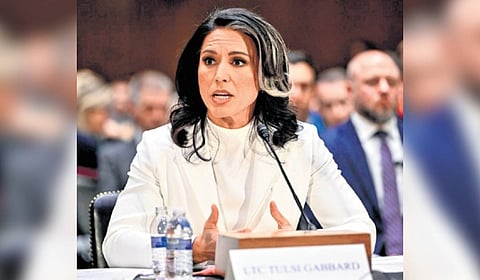

Signalgate sounds pointedly scandalous. But does it have the cachet of the earlier ‘-gates’? Here are some consequential ones—Watergate, Murdochgate, AbuGhraibgate, Bibigate, Cablegate, Gaetzgate, Contragate, Choppergate and Coalgate (the last two from India). Wikipedia has a dynamic list of 286 events that are –gate suffixed, ranging from political shockers to frivolous hijinks.
For liberals, Signalgate—in which 18 US government topliners admitted the editor of an anti-Trump magazine, The Atlantic, into a high-security group chat on the Signal messaging app about impending US airstrikes on Yemen—is a determinant of the fundamental incompetence of the Trump administration. For Trumpistas, the event is not a scandal, much less a breach of security. But the administration is swimming against the tide on this. In an opinion poll, 76 per cent of Americans, including 56 per cent of Republicans, said that using Signal to discuss military plans was inappropriate.
The entire Trump team involved in the group chat and other Trump officials who circled the wagons around them joined in spinning the major leak into a storm in a teacup. They also began shooting the messenger, Atlantic editor-in-chief Jeffrey Goldberg, as if he had trespassed by being a silent spectator in a group that he had been erroneously added to by National Security Advisor Mike Waltz.
This event is more than about a leak. It is about the stunning maladroitness of the topmost echelon of the Trump administration, that “emblematic array of knuckleheads and butterfingers”, as David Remnick described them in The New Yorker.
It was not just one security breach. Despite his later assertion that “nobody was texting war plans”, Secretary of Defence Pete Hegseth let slip the exact timings of the US airstrikes on the Houthis, and the F18s, Tomahawk missiles and MQ-9 drones to be employed. Waltz commented that the US had “positive ID” of the Houthi “top missile guy” entering “his girlfriend’s building”, which “collapsed”—thus letting slip to the Yemeni group that they were being tracked real-time by surveillance drones or signals intelligence.
Before the advent of chat apps, a conclave such as the one formed by these 18—which included Vice President J D Vance, Director of National Intelligence Tulsi Gabbard and CIA Director John Ratcliffe—would have met in a closed war-room to discuss attack plans (or, Trump’s war plans, since it was the US’s biggest military operation in the region). In all likelihood, the POTUS would have had to be present, not only privy to but also overseeing the pow-wow.
But Trump was not even in on it, and it took place in a militarily unsecured app. The usual protocol of various heads of security agencies being hermetised from one another, and discussing operations only in official, securitised venues, was not followed. This corps d’elite mingled as if teenagers grouping at a rave.
Signal is a secure-enough end-to-end encrypted app for quotidian real-world purposes. But there is a reason why the use of apps such as Signal, WhatsApp and Telegram is disallowed by the US and UK governments for what are known as “sensitive communications”. These have to be carried out in approved intelligence systems that connect only authorised intercommunicators.
This is why top-level secured communications are restricted to sensitive compartmented information facilities (SCIF, or ‘skiff’) with electromagnetic, visual and acoustic snoop-shielding. One such is the Situation Room in the West Wing of the White House, made famous by images of former US president Barack Obama seated in it watching the operation to eliminate Osama bin Laden unroll.
There are thousands of skiffs—both permanent and built-as-needed—in the US. All these are, according to the US Commerce Department’s National Institute of Standards and Technology, “certified and accredited as meeting Director of National Intelligence security standards”. The DNI is Tulsi Gabbard, one of the members of the Signal chat.
Given that she has been revealed as one of Trump’s most clueless appointees, it is difficult to surmise that she even considered congregating the group in a skiff. She had told the Senate Intelligence Committee that there “was no classified material that was shared in that Signal group” before frantically backtracking apologetically when Goldberg, angered by the baldfaced lying, released even more screenshots of the chat.
A Pentagon ‘OPSEC special bulletin’ sent through the defence department three days after Goldberg splayed this chat all over the media had warned against using Signal, following news reports that Russian intelligence had tried to waylay it and trick Ukrainian military users into sharing their details.
Security is clearly the Trump administration’s Achilles’ heel. Der Spiegel reported in late March, just when the Trumpistas had bludgeoned their way through the tsunami of criticism, that its “reporters were able to find mobile phone numbers, email addresses and even some passwords belonging to the top officials” (including Waltz, Gabbard and Hegseth) using “commercial people search engines along with hacked customer data that has been published on the web”.
Signalgate signals more than a minor-lapse leak. It defines the Trump administration’s maverick work ethic of playing it fast and loose.
Kajal Basu
Veteran journalist
(Views are personal)
(kajalrbasu@gmail.com)